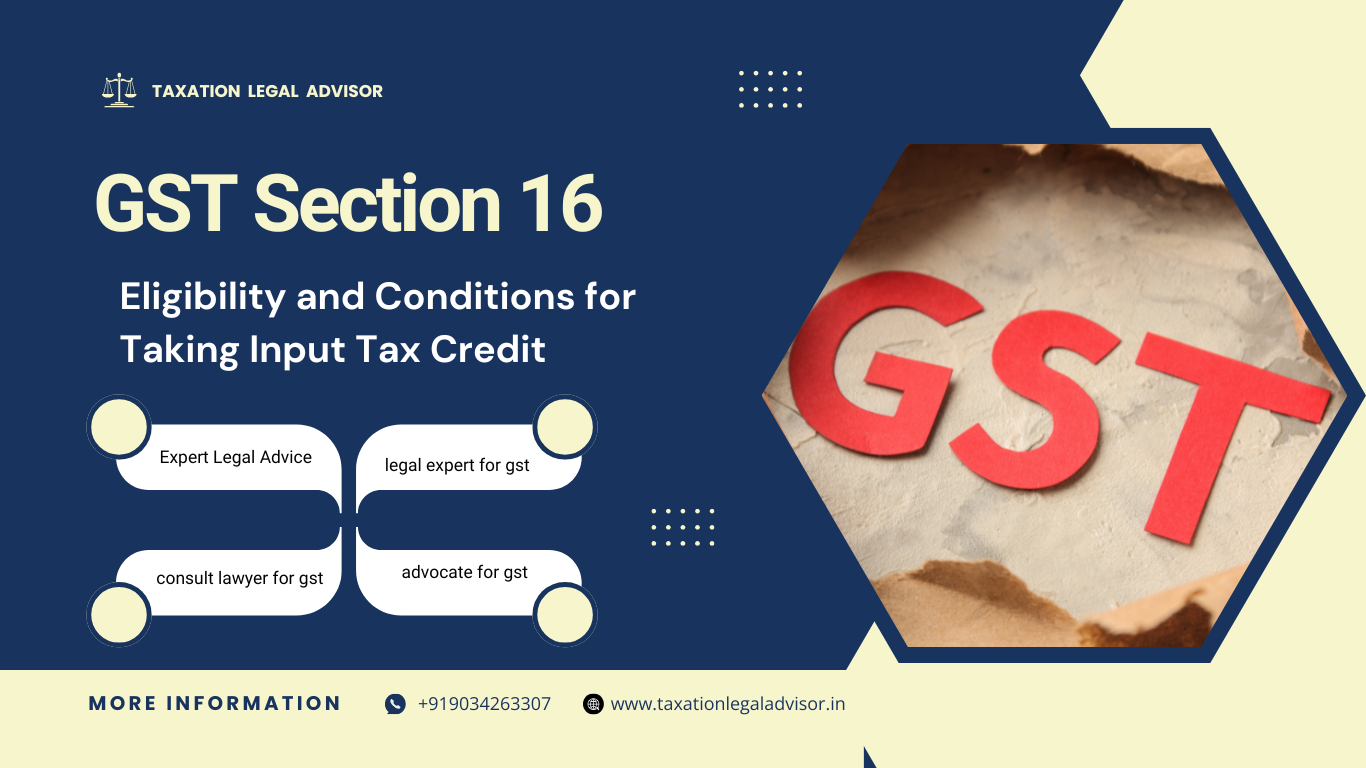Introduction
Under the Goods and Services Tax (GST) regime, Input Tax Credit (ITC) is a crucial mechanism that allows businesses to reduce their tax liability by claiming credit for taxes paid on inputs. Section 16 of the CGST Act, 2017 lays down the eligibility criteria and conditions for availing ITC. Understanding these provisions is essential for businesses to ensure compliance and avoid penalties.
This article provides a detailed analysis of Section 16 of GST, covering eligibility, conditions, and key compliance requirements for claiming ITC.
Eligibility for Claiming Input Tax Credit (ITC)
To claim ITC under GST, a registered taxpayer must fulfill the following conditions:
1. Possession of Valid Tax Invoice or Document
The taxpayer must have a valid tax invoice, debit note, or other prescribed documents issued by a registered supplier.
2. Receipt of Goods or Services
The goods or services must have been received by the taxpayer. In case of goods, the supplier must have delivered them, and for services, they must have been rendered.
3. Payment of Tax to the Government
The supplier must have paid the GST charged to the government, either in cash or through ITC.
4. Filing of GST Returns
The taxpayer must have filed GST returns (GSTR-3B and GSTR-1) to claim ITC.
5. Time Limit for Claiming ITC
ITC must be claimed on or before the earlier of the following:
- The due date of filing GSTR-3B for September following the end of the financial year (i.e., 20th October).
- The date of filing the annual return (GSTR-9) for the relevant financial year.
Conditions for Availing ITC
Apart from eligibility, certain mandatory conditions must be met to claim ITC:
1. ITC on Capital Goods
Businesses can claim ITC on capital goods used for business purposes. However, if such goods are used partly for business and partly for personal use, ITC will be allowed only for the business portion.
2. ITC on Inputs and Input Services
- ITC is available on inputs and input services used for business purposes.
- If inputs are used for exempt supplies, ITC will not be allowed.
3. Reversal of ITC in Certain Cases
- If payment to the supplier is not made within 180 days, the ITC claimed must be reversed with interest.
- ITC must be reversed if goods are lost, stolen, or written off.
4. Blocked Credits (Section 17(5))
Certain expenses do not qualify for ITC, such as:
- Motor vehicles (except for specific business uses)
- Membership of a club, health, or fitness center
- Travel benefits to employees
- Works contract services for construction of immovable property (except for plant & machinery)
Documents Required for Claiming ITC
To claim ITC, taxpayers must maintain:
- Tax invoice or debit note
- Bill of entry (for imports)
- ISD invoice (if credit is received from Input Service Distributor)
- Receipt voucher (for reverse charge supplies)
Common Mistakes to Avoid While Claiming ITC
- Claiming ITC without a valid invoice
- Non-payment to supplier within 180 days
- Claiming ITC on blocked credits
- Failing to file GST returns on time
- Not reconciling GSTR-2A/2B with books
Conclusion
Section 16 of the GST Act provides a structured framework for claiming Input Tax Credit, ensuring businesses can reduce their tax burden while maintaining compliance. However, strict adherence to eligibility criteria and documentation is crucial to avoid disputes or reversals.
For expert guidance on GST compliance and ITC claims, consult Taxation Legal Advisor, a leading legal firm specializing in GST, taxation, and corporate laws.
📞 Contact Us at+919034263307 Today for a consultation!
📧 Email: [contact@taxationlegaladvisor.in ]
🌐 Visit: https://taxationlegaladvisor.in










